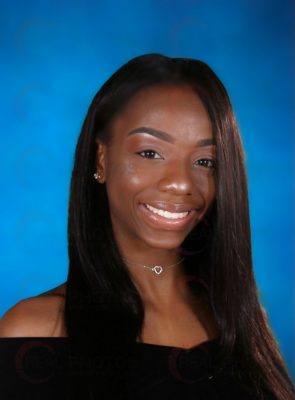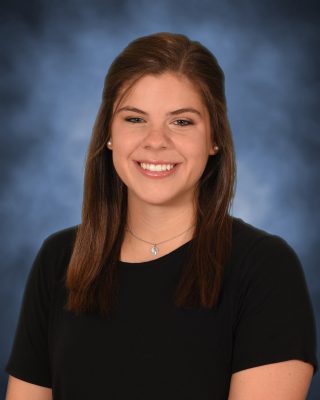Michele Ho, Ashanti Hunter, and Jacqueline Ritz received research grants through the Syracuse University Office of Undergraduate Research and Creative Engagement, known as the SOURCE. These grants will support research during the 2021-2022 academic year.
The SOURCE was created to foster and support diverse undergraduate participation in faculty-guided scholarly research and creative inquiry. Student participants progress through initial training in research or other creative skills, to designing and revising the structure of their projects, and culminating in research, creative and professional contributions that are original and timely, working with SOURCE staff and student research mentors at every step.
Michele Ho
 Ho’s project “Pipeline to Educational Leadership Positions for Women of Color: Studying District Administrators” will study women of color who are district-level administrators and examine the adversities that they have overcome to get into their positions.
Ho’s project “Pipeline to Educational Leadership Positions for Women of Color: Studying District Administrators” will study women of color who are district-level administrators and examine the adversities that they have overcome to get into their positions.
“I was inspired by my exposure and understanding of the importance of representation,” says Ho of her research. “Women of color tend to be more marginalized in the field of education, so having women in leadership roles can be a direct source for facilitating sustainable change to help mitigate inequality in the school districts they represent.”
She worked with her faculty mentor, Professor George Theoharis, to create a strong funding proposal for SOURCE and brainstorm ways to present their research findings to the broader Syracuse community. Ho hopes that her project findings can guide and assist women looking to obtain positions in district administration.
Theoharis echoes that “Women of color are vastly underrepresented in K12 education – both in teaching and administration,” but women currently in those roles are eager to share their stories with next generator of educators and leaders.
Ho plans to go into educational leadership and further explore the impacts of race, gender and class on education to advance educational justice. An inclusive early childhood special education major, she chose her field because of her love of children and strong belief that every child deserves access to quality education.
“I want to be a part of the change that will make education more accessible for all students,” says Ho. “The needs of children are constantly changing, and inclusive education practices benefit all students.”
Ashanti Hunter
 Hunter’s project “Pipeline to Educational Leadership Positions for Women of Color: Focus on Building/School Administrators” examines on women of color and their experiences obtaining school building leadership roles.
Hunter’s project “Pipeline to Educational Leadership Positions for Women of Color: Focus on Building/School Administrators” examines on women of color and their experiences obtaining school building leadership roles.
She was inspired to explore this topic because “as a Black woman and a future educator, it is extremely important to me to understand what other women of color have experienced. I hope to use this research to change the narrative for women of color who enter school leadership which include finding supports to increase diversity in these roles.”
Both Ho and Hunter’s projects build on past SOURCE research by Jenny Gines ’21, an inclusive elementary and special education major. Theoharis, who was Gines’ mentor and now mentors Hunter as well as Ho, knew including emerging female teachers of color in this work as vital to the success and impact of the project.
“This was my first time ever participating in this form of work and George was there to answer all questions I had and to help guide me in creating an appropriate proposal.”
Hunter is an early childhood special education teacher and plans to teach in an inclusive kindergarten or first grade classroom after graduation.
“I have always been interested in teaching younger children. These are the individuals of our future, so it is crucial to properly prepare and educate them.”
Jacqueline Ritz
 Ritz’s project “Integrating Anatomical Model References in the Teaching of the Pronunciation of Spanish and English as a Second Language” will explore whether phonetically-based teaching in the initial process of second language acquisition can increase native-like pronunciation in a second language. Ritz, a dual major in Spanish language, literature and culture and Spanish education, was first interested in this area during her introductory Spanish linguistics course with College of Arts and Sciences Associate Professor M. Emma Ticio Quesada, her research mentor.
Ritz’s project “Integrating Anatomical Model References in the Teaching of the Pronunciation of Spanish and English as a Second Language” will explore whether phonetically-based teaching in the initial process of second language acquisition can increase native-like pronunciation in a second language. Ritz, a dual major in Spanish language, literature and culture and Spanish education, was first interested in this area during her introductory Spanish linguistics course with College of Arts and Sciences Associate Professor M. Emma Ticio Quesada, her research mentor.
“After learning the phonemes and allophones of Spanish, I realized that my pronunciation and listening skills improved tremendously, and I wondered why I did not learn this information when I started learning Spanish eight years ago.” Ritz worked with Ticio Quesada as a research assistant before using what she learned as a basis for her SOURCE project.
Ritz hopes her research can not only help advance second language teaching, but also increase appreciation of diversity and understanding among speakers of different languages.
“Having a rich variety of accents adds to the diversity of languages and is highly desired in any multicultural society. Unfortunately, some non-standard accents can trigger linguistic discrimination, a lack of intelligibility between speakers, and harm the motivation and success of second language learners. I am to research a method of teaching pronunciation to increase intelligibility – the ability to be understood – between the speaker and listener, not to take away one’s accent.”
After graduating, Ritz plans to teach Spanish as well as pursue graduate studies in Spanish linguistics.
